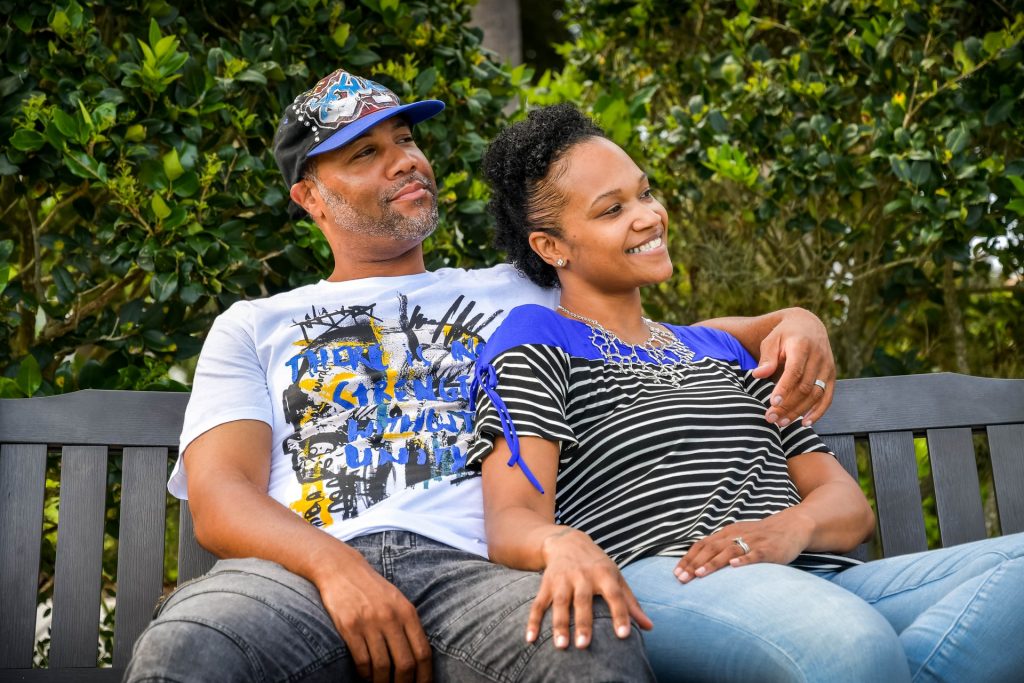There are countless books, manuals, courses, retreats, etc., out there that speak to the topic of love and marriage. These tell stories of hope, of marriages on the rocks that were restored, and of the joy of finding and committing to a marriage partner. Many of these courses base their teaching and wisdom on what the Bible says on the topic, and so it doesn’t hurt to revisit the source directly. Hearing God’s perspective through Bible verses about love and marriage helps us as we try to navigate an increasingly complicated area of our lives. The Bible gives us a larger-than-life look at what God’s intention and plan for an intimate committed relationship is and knowing that just might change everything.

Of course, while the Bible was written in a time before Tinder, online dating, and many of the intricacies of dating, relationships, and marriage that we know in our time, but that doesn’t mean that it isn’t relevant. On the contrary, that makes it even more relevant. After all, the 21st century isn’t the first time a person has lied about who they are to get romantic attention, nor are we the first generation to deal with a desire for intimacy (of all sorts) but without commitment.
Our technology may become more advanced, but the human heart is still the same, and the Bible does a thorough job of showing us what our hearts are like and how to protect ourselves from self-deception and the deceptions of others. No doubt, how these things manifest in our time may look different and we may need guidance to recognize the patterns (such as courses, therapy, books, and manuals), but at its core, the human condition is fundamentally the same. If you’re seeking support in understanding and navigating these patterns in your life, Thousand Oaks Christian Counseling can offer the guidance and resources you need to recognize and grow through these challenges.
What does the Bible tell us about love and marriage? You may find some of it surprising. Read on!
Some Bible Verses About Love and Marriage
In the beginning . . . it was great
We are told that for humans to fulfill their function of being faithful stewards over God’s creation, there needed to be at least two of them. The two of them would share the task of taking care of God’s world, and together they could be fruitful and multiply. When Adam is first introduced to his future bride in Genesis 2, he waxes poetic, saying, “Now this is bone of my bone, and flesh of my flesh. She shall be called woman for she came out of man” (Genesis 2:23).
 Adam was praising God for this woman whom God had made, someone who was his true equal and similarly made in God’s image. They were unique, and for each other. God brought Eve to Adam and performed the first wedding ceremony.
Adam was praising God for this woman whom God had made, someone who was his true equal and similarly made in God’s image. They were unique, and for each other. God brought Eve to Adam and performed the first wedding ceremony.
It is here that we hear those words, “For this reason, a man will leave his father’s house and shall hold fast to his wife, and they shall become one flesh. And the man and his wife were both naked and were not ashamed” (Genesis 2:24-25). There was vulnerability, intimacy, and love between the two lovers. Nothing could come between them, right?
. . . but in Genesis 3 – things fell apart.
Things are the way they are in our world today for a reason. People don’t always regard one another as equal in dignity and worth. People struggle with commitment issues, selfishness, and so much more that disrupts and creates dysfunctional relationships. In Genesis 3, God is revealing the dynamics that interrupted the idyllic situation of Chapter 2 and showing how we got to where we are today.
The story goes that the couple decided to disobey God and strike it out on their own. They lacked nothing in their paradise; nothing apart from the responsibility to determine for themselves what was good and what was evil. That was something God in his wisdom had reserved for himself. But the couple believed the lie that God was withholding something from them and decided to disobey God. From the moment that Eve began to question God, things fell apart.
Apart from God, there is no life because God is the source of life. Because of Who He is, God is the only one qualified to say what is good and evil. Left to ourselves, our sinful nature always distorts our thinking about morality and ethics.
Some of the most heartbreaking verses are found in Genesis 3. As the couple turns away from God, they turn away from and against each other too. Adam turns from love ballads to blaming God and his wife for the predicament they find themselves in, while Eve also shifts blame and refuses responsibility. No one owns their mistake.
Distrust blooms in the relationship, and now vulnerability feels dangerous. As a result, the couple not only tries to cover their nakedness, but they try to hide from God too. This sums up the human condition as we know it.
 We long for intimacy and vulnerability, to know and be known, but it also terrifies us. We want ownership of our lives, rather than acknowledging God’s supreme and undisputed ownership. We struggle to own up to our sin, choosing to obfuscate or blame others, and even God.
We long for intimacy and vulnerability, to know and be known, but it also terrifies us. We want ownership of our lives, rather than acknowledging God’s supreme and undisputed ownership. We struggle to own up to our sin, choosing to obfuscate or blame others, and even God.
This is the new situation Adam and Eve found themselves in, and that is what they passed onto their children. Love and marriage are infinitely complicated, and there is a lot of pain in our relationships because of the dynamics of sin in the human heart.
Life is still beautiful . . . but it’s messy.
Because of God’s common grace, life is still beautiful. One of the most beautiful expressions and celebrations of human love can be found in the Song of Solomon, a long poem that follows the story of a woman and her fiancé. Their descriptions of one another echo and amplify what Adam said to his wife Eve, which reminds us that the promise of intimacy and beauty in relationships is still possible, even though our hearts have dark recesses in them.
But while life is still beautiful, it’s also painful and messy. One of the refrains of the poem is “Do not awaken love before its time,” reminding us that there’s such a thing as getting intimate (emotionally and physically) in inappropriate contexts. But because of sin, we find that instead of sticking to one spouse, people wanted more than one spouse (let’s be frank – in the patriarchal culture of the time, it was the men who were able to fulfill this desire).
When asked about marriage and divorce, Jesus reminded his hearers that God’s intention for marriage was one man and one woman for life (Matthew 19:1-12), something that is as controversial in our day as it was when Jesus said it.
We find peppered throughout the Bible narratives about polygamy. From Jacob, David, Solomon and so many others, people have many wives and large families. The striking thing about these stories is that they never end well. The competing interests of spouses and their children often erupt in violence. That those stories don’t end well is a strong indicator that what people were doing wasn’t right.
No doubt, polygamy isn’t the only factor at play here. After all, Cain killed his brother Abel, and Adam had only one wife as far as we know. In their sin, human beings do terrible things to one another, but perhaps the point being made about polygamy throughout the many narratives is that it’s pouring fuel over an already volatile situation. It aggravates already complicated realities.
What’s it all about?
 When we think about marriage, this committed relationship between two people for life, and when we see the joy, hardships, and beautiful messiness of it all, it’s not surprising to ask ourselves what it’s all about. Does human love and marriage mean more than what we see? One of several places where we see the larger-than-our-lives purpose behind marriage is in Ephesians 5.
When we think about marriage, this committed relationship between two people for life, and when we see the joy, hardships, and beautiful messiness of it all, it’s not surprising to ask ourselves what it’s all about. Does human love and marriage mean more than what we see? One of several places where we see the larger-than-our-lives purpose behind marriage is in Ephesians 5.
In telling husbands and wives how they are to relate to one another, Paul says, “’Therefore a man shall leave his father and mother and hold fast to his wife, and the two shall become one flesh.’ This mystery is profound, and I am saying that it refers to Christ and the church” (Ephesians 5:31-32). Human marriage is an echo of a much larger reality, the relationship between Jesus Christ and his people.
This isn’t a new concept, because in the Old Testament, God says multiple times that he is the husband of his people, and they are his bride. For example, the whole book of Hosea is about how God’s people have been an unfaithful spouse even though God has remained faithful. God continues to pursue us even though we are faithless and pursue other lovers (meaning other gods and pursuits).
In the last book of the Bible, we read this: “And I saw the holy city, new Jerusalem, coming down out of heaven from God, prepared as a bride adorned for her husband. And I heard a loud voice from the throne saying, ‘Behold, the dwelling place of God is with humanity. He will dwell with them, and they will be his people, and God himself will be with them as their God. He will wipe away every tear from their eyes, and death shall be no more, neither shall there be mourning nor crying nor pain anymore, for the old order of things has passed away.’” (Revelation 21:2-4).
God’s people are referred to as “the bride” of God. This is a picture of God’s people throughout the ages being united to God forever and ever. And so, marriage really points to the deeper reality of our relationship with God; human marriage gives us the language we need to understand how God relates to us.
Marriage is thus a high calling (especially for believers) because it illustrates how God relates to His people. Understanding that can help us see why adultery and divorce are so important. If you’re struggling with these challenges in your marriage, Thousand Oaks Christian Counseling is here to help provide guidance and support as you navigate these difficult issues.
“Book and Phone”, Courtesy of Debby Ledet, Unsplash.com, CC0 License; “The Power of Touch”, Courtesy of Talor Deas-Melesh, Unsplash.com, CC0 License; “Bible Study”, Courtesy of Aaron Burden, Unsplash.com, CC0 License; “Couple Relaxing”, Courtesy of Shawnee D, Unsplash.com, CC0 License
-
Kate Motaung: Curator
Kate Motaung is the Senior Writer, Editor, and Content Manager for a multi-state company. She is the author of several books including Letters to Grief, 101 Prayers for Comfort in Difficult Times, and A Place to Land: A Story of Longing and Belonging...
DISCLAIMER: THIS ARTICLE DOES NOT PROVIDE MEDICAL ADVICE
Articles are intended for informational purposes only and do not constitute medical advice; the content is not intended to be a substitute for professional medical advice, diagnosis, or treatment. All opinions expressed by authors and quoted sources are their own and do not necessarily reflect the opinions of the editors, publishers or editorial boards of Stone Oak Christian Counseling. This website does not recommend or endorse any specific tests, physicians, products, procedures, opinions, or other information that may be mentioned on the Site. Reliance on any information provided by this website is solely at your own risk.





